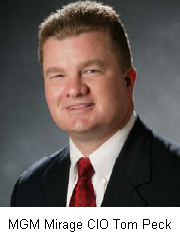MGM Mirage's IT green field: RFID meets alcohol; predictive modeling; bandwidth galore

Very few technology executives ever get a green field to play with. MGM Mirage CIO Tom Peck has an $8 billion green field--actually massive construction project dubbed CityCenter--right in the middle of the Las Vegas strip.
Peck was speaking at the Gartner Emerging Technologies Conference in Las Vegas Wednesday and dished out a few lessons on how to make big technology bets, the importance of SOA and tracking customers in a way that borders on big brother.
Here are a few lessons learned Peck as MGM builds out CityCenter, a development project that is expected to be complete by the end of 2009:

Culture: Peck said he's trying to build a corporate culture that doesn't fear making mistakes. He added that IT does the usual stuff--benchmarking ROI, running a help desk and support--but also is aggressive. "There's a fine line between making mistakes and failure," says Peck. "You can't let failure happen and should do course corrections early and often." Simply put, Peck advocated taking a few technology shots, but knowing how to cut losses.
Betting on technology that customers won't see for 18 months at least: Peck is in an odd position. He has to invest in technology that isn't cooked up yet. Consider MGM Mirage something more extreme than an early adopter--there's a risk that Peck could be a premature adopter. The key is to make architecture decisions that won't box you in. Peck is playing with everything from SOA to RFID chips to data warehousing at a massive scale. "The challenge is scary and exciting," said Peck. "We're making bets on technologies."
Some key examples of these tech bets include:
- SOA: Peck said CityCenter's technology architecture--as well as other MGM Mirage properties such as Mandalay Bay--will run on SOA. During his talk made SOA sound a lot less academic. His example: A customer will check in and the data will follow him via an enterprise service bus--essentially a highway for Web services to swap information--to the room and open it to boot. "No one has ever done SOA development where a check in will travel the enterprise service bus and open the room," said Peck.
- RFID: Peck said that door locks and keys are already in place and they will be enabled with RFID to collect data. What's odd about Peck's comment is that MGM Mirage has acquired RFID powered doors and keys before the walls are even up on CityCenter. MGM Mirage has numerous RFID pilots. For instance, Peck said MGM Mirage has RFID-enabled casino chips to deter fraud and theft. RFID is also used for loss prevention of uniforms and liquor. One annoying--at least if you like free beer--example: MGM has RFID sensors linked with pouring spouts to monitor bartenders and waiters so they don't hand out liquor in exchange for big tips.
- Wireless connectivity: Peck is installing 10,000 IP switches in guest rooms. One challenge with these switches: Heat, which could be a problem since the switches will be embedded in the walls of rooms. To tackle these challenges, MGM has a lab. Peck said he has been partnering with vendors to "develop the next product line that doesn't exist today."
The importance of data warehousing: MGM Mirage has 85 million records on their customers--transactions, trips to the spa, favorite beverage and whether you played black jack or the slots. Peck's job: Put all of this data together in a way that improves the bottom line and customer service. On the hardware side, the data warehouse and data center game is relatively straightforward: "The key to innovation is bandwidth and storage," says Peck. The primary role for the data warehouse is cycling those records, cleansing them and putting it all together in real-time. Systems have to be real time to track customer behavior and be able to predict the future. Only when enough data is collected to predict the future does MGM Mirage have a little secret sauce. "The algorithms for predictive modeling are really our killer application," said Peck.
Connecting the dots: To compile all that data, MGM Mirage has to connect its various systems. For instance, video cameras, transaction tracking--which MGM Mirage has to do anyway for regulatory purposes--kiosks and services all have to be delivered in via one device. Peck acknowledged that the plan "borders into big brother," but can result in a better experience if customers opt in to this future program. "We have that ability (to connect these data points), but are not doing it today," said Peck
Peck's testbed and his hits and misses at MGM Mirage are definitely worth watching going forward--especially when you consider that the technology successes will be coming to the company's other casinos near you.